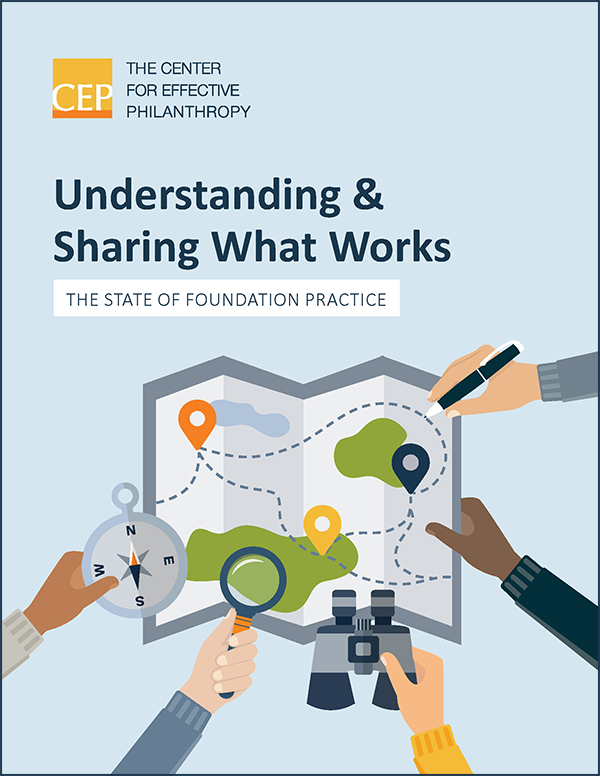Media Contact: Grace Nicolette, Vice President, Programming and External Relations: 617-492-0800 x236
FOR IMMEDIATE RELEASE
Cambridge, MA — New research released today from the Center for Effective Philanthropy (CEP) finds that while the majority of foundation CEOs believe they understand well what is working in their programmatic efforts, more than 40 percent believe their foundation is not investing enough time and money in developing that understanding. The report, titled Understanding & Sharing What Works: The State of Foundation Practice, also finds that while foundations are sharing at least some of their knowledge externally, foundation CEOs believe foundations are not sharing more due to a lack of capacity, a hesitancy to expose failure, and difficulty in determining what exactly is useful to communicate.
“Assessing performance is crucial to learning and improvement for foundations, but seeing as there’s no one outcome or measure to determine success, it is notoriously challenging,” says Ellie Buteau, CEP’s vice president, research, and co-author of the report. “Foundations recognize the importance of this work, and many are building their understanding of what works and sharing that knowledge, but there seem to be missed opportunities, and more can be done.”

Findings in the report are based on survey responses from 119 CEOs of private and community foundations giving at least $5 million annually, as well as in-depth interviews with 41 CEOs. Almost two-thirds of foundation CEOs say they understand very or extremely well what is working in their foundation’s overall efforts to achieve its goals, yet fewer than half say they understand very or extremely well what is not working in those efforts. Learning what is and isn’t working requires investment, and more than 60 percent of CEOs attribute their level of understanding specifically to the level of effort their foundation puts into assessment and learning.
When it comes to how foundations are using their knowledge about what is and isn’t working, 80 percent of CEOs say their foundation uses that knowledge to inform decision-making, specifically in decisions that ultimately lead to the continuation, reorientation, or termination of grants, programs, initiatives, or strategies.
In terms of understanding and learning from peers’ knowledge, however, foundations may be missing opportunities. About three-quarters of foundation CEOs report their foundations share at least some of its knowledge externally, most frequently with their grantees and other foundations, but few CEOs say that they have quite a bit of knowledge about what is and isn’t working in the programmatic efforts of other foundations focused on the same or similar goals.
One thing that may be holding foundations back from sharing more is a hesitancy to expose failure. More than one-third of CEOs say foundations do not share more about what they know is and isn’t working because they are hesitant to share mistakes or failures about programs or strategies that didn’t work. About one-third of CEOs specifically mentioned that their foundation faces pressure from its board of directors to withhold information about failures.
“Foundations are taking on complex social and environmental problems, so understanding what is and isn’t working in that work is likewise complex,” Buteau says. “Each foundation must determine for itself the best methods for learning from its work, and how to balance the risks and rewards of sharing that learning with others. After all, understanding what’s working and what isn’t — and learning from the knowledge of peers — can be crucial to creating the greatest positive impact in the areas funders care most about.”
The report is accompanied by a series of in-depth profiles to further examine what foundations are doing to understand and share their work. The profiles, authored by Lowell Weiss of Cascade Philanthropy Advisors, are of Rockefeller Brothers Fund, Weingart Foundation, Communities Foundation of Texas, and Impetus-PEF.
This research was made possible by support from the Fund for Shared Insight.
The report and the accompanying profiles are available for free download on CEP’s website.
About the Center for Effective Philanthropy
The Center for Effective Philanthropy (CEP) is a nonprofit organization with a mission to provide data and create insight so philanthropic funders can better define, assess, and improve their effectiveness and impact. CEP received initial funding in 2001 and has offices in Cambridge, Massachusetts and San Francisco, California. For more information on CEP’s work, including its research, publications, programming, and assessments and advisory services, visit www.cep.org.

